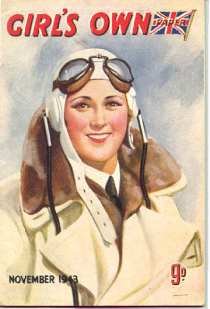| bc |
Captain W E
Johns and Worrals, by Jim Mackenzie Worrals of the WAAF
Article
by:
James Mackenzie
Have you
read the Worrals books ? There is no doubt that quite a
few boys (and men), totally hooked on Biggles, can not
imagine the possibility of reading a series of adventures
that were written specifically for girls. With what a
woman would call "typical male arrogance" they
may shy away from stories about a girl of 18, whose very
name suggests a poor carbon copy of the intrepid pilot
whose name they have come to love. Well, just like the
jokers at Cranwell who decided that "cissy" was
a good name for Bertie Lissie, (Spitfire Parade), they
couldn't be more wrong.
After all, W.E.Johns,
like Biggles himself, is totally reliable - you know that
you are going to get value for money when he starts to
tell you a story. A little more investigation about when
the Worrals stories were written would reveal that they
came in the middle of his "purple patch" or
even his "vintage period". A true fan of
Biggles would have to admit that some of the later
adventures, as Biggles draws towards retirement, though
still worth reading, lack the zest and the pace of those
conceived and written on either side of the Second World
War. If you haven't done so already, and if you have
exhausted the quest for those elusive last volumes of
Biggles, then get hold of the Worrals series and discover
an unsuspected feast of fast-moving exploits.
| Worrals
is different. She may have been devised by Johns
as a propaganda heroine to entice young girls
into the forces during World War 2 but she
quickly evolved into a distinct personality who,
though she clearly shares some of the same ideals
as Biggles, Algy, Ginger and Bertie, has her own
remarkable view of the world. The extra dimension
is that she is a woman in a world completely
dominated by men. Moreover, these are men engaged
in a desperate war of survival. From the very
start she is the underdog, the one who must
battle not just the various enemies that cross
her path but also with the uncomprehending and
preoccupied higher command on her own side. The
modern adjective to describe her would be
"feisty". Some of her attitudes would
strike a chord with those engaged in the more
rational aspects of the women's struggle for
equality during the last two decades. However,
whether you are a male or female reader, you
can't help being on her side. W.E.Johns said of
his creation: "She undertook some remarkable
missions, but none (although for security reasons
this couldn't be divulged at the time) more
desperate than were actually being made by girls
in the same Service" (The First Biggles
Omnibus). |
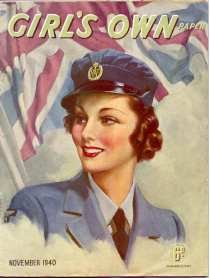 |
Her adventures
outlasted the war. They are listed here and the flavour
of each book is suggested, though enough details are kept
back, so that you can discover them yourself.
Why was the grey horse
in the field ? Why did that golf course have a line of
bunkers all at one end of the fairway ? You soon realise
that when Worrals is around you are going to be plunged
into mystery and adventure. A routine job delivering a
plane to the advanced R.A.F. post gives the 18 year old
pilot her first challenge and her first dilemma. She can
fly like a man but does she have the ruthless streak ?
The answer soon comes.
"Almost viciously she jammed down the button.
Instantly little sparks of orange flame spurted from the
muzzles of her guns. They ended in gleaming silver lines
that leapt across the intervening distance and ended at
the starboard engine of the grey monoplane."
Later you can share her frustration when she stumbles on
a clue to espionage and is told to forget it.
"There are moments when I wonder whether some of our
senior officers have sawdust in their heads instead of
brains."
This is what she tells her friend, Frecks Lovell, and
together they set out to find the truth and first they
walk and then fly straight into danger. The enemy makes
no exceptions for women -
"Let go of that stick or I'll shoot you," he
rasped, and Worrals knew that he meant it.
And Worrals reveals no weaknesses in her nerve -
"Shoot," she invited grimly, her eyes on the
reflector.
A weekend leave is crammed with so many pursuits and
traps, tricks and escapes, explosions and crashes, that
the reader is left breathless, yet still keen for more
adventures.
For his first Worrals story W.E.Johns maintains a high
speed of narrative, with little detailed description but
the prickly, headstrong and dauntless character of
Worrals has already fastened herself on your imagination.
Flying Officer Bill
Ashton calls them the "kids" but Worrals and
Frecks once again win the respect of all their male
colleagues as they battle through another encounter with
the Germans in this roller-coaster of a narrative. Yet
this story is a curious combination of clues thoughtfully
worked out, lines of inquiry carefully followed up and
then non-stop action as the narrative rushes to its
climax.
A leaf stuck in the tyre of a returning pilot sets
Worrals' Sherlockian mind in motion. A trip to London and
the Green Parrot night club increases her doubts about a
suspect. And then the bombs of the Blitz start to fall !
From the inside of an abandoned ice-cream factory to the
depths of a church crypt in occupied France is an unusual
journey, full of surprises for both the reader and for
the girls.
Frecks was silent for a little while.
"This show isn't turning out as easy as we
expected."
"Shows rarely do," Worrals pointed out, sadly.
And, as the dangers mount, Worrals discovers that there
is something more than mere comradeship between herself
and Bill.
W.E.Johns serves up the mixture as before, though he
spends less time developing Worrals' chip on her shoulder
about the female contribution to the war effort.
So far in the Worrals
saga she has found the adventures for herself in the
ordinary events that surround the aerodrome where she and
Frecks serve. In this story she receives a personal
invitation to danger. This time the W.A.A.F. uniforms are
not just hidden, they are discarded for disguises. This
time Frecks is not just a companion for Worrals, sharing
the dangers and solving the problems. She has to face the
world, believing that Worrals has perished. This time
W.E.Johns doesn't just serve up a kaleidoscope of rapid
and violent events with hair-raising chases across
anonymous stretches of countryside. This time the story
is located precisely in an atmospheric locale with
well-developed characters. This time there is a
despicable villain whose malevolence is matched by his
efficiency.
Yes, Worrals has matured from being a gifted amateur into
a dedicated professional. By now her skill at flying we
take for granted but her sheer nerve and capacity for
bluff are nowhere more impressive. The challenges she
faces have become as much psychological as physical. She
has become harder and it shows even in her attitude to
her own senior officers.
"Just a moment, sir," interrupted Worrals
coldly. "Are you suggesting that any useful work I
may have done in the past was due entirely to the fact
that being a girl I enjoyed privileges that would have
been denied to a man?"
She is clearly strong enough for the work that awaits her
at the mysterious Chateau Delarose. That is… until
Bill gets into deep danger.
For the first time
W.E.Johns gives his Worrals story the "why are they
there?" opening that he employs so often in the
Biggles saga. In chapter one Worrals and Frecks are there
in France, moreover in the heart of wartime France, and
the story has to backtrack to the reasons for her latest
mission. And the reason that the girls are there is a
wild idea, so highly improbable that it could only have
come from the mind of Worrals.
"What you'll lose, my gal, if you go on playing with
fire, is your life," snorted the CO
"Did no one ever tell you that, when you were
collecting all those medals on your chest ?" asked
Worrals evenly.
The CO bristled. "That's nothing to do wi't.. I'm a
man."
Of course,
nothing could be more calculated to put Worrals
on the warpath - except that's not what the title
means.
Once again W.E.Johns pauses to allow you to drink
in the atmosphere of that very special region,
the Cevennes, and he makes you understand the
special qualities of the people who live there.
Then he plunges his heroines into a hurly-burly
of action that has them almost constantly on a
knife-edge between the perils of the peaks and
the brutality of the Gestapo. Strangely enough it
is her woman's wiles that get her out of a
difficult situation. Is this below really Worrals
?
She affected a look of distress. "It
is," she said in a broken voice, "an
affair of the heart."
However, later we know she is back to her old
self when Bill Ashton calls her Boadicea instead
of the usual patronising "kid".
Oh, by the way, Air Commodore Raymond has now got
her in his team. She's clearly made the grade -
just like Biggles did before her. |
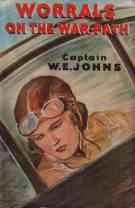 |
Set a thief to catch a
thief. Set a woman to catch a woman. Worrals and Frecks
go east, recommended by Air Commodore Raymond, and try to
solve a problem for Major Kenton in Syria. As Nimrud,
their bodyguard, tells them in Aleppo, they are mere
bints and, as Major Kenton warns them:
"You realise that in putting on this act you may be
running a grave risk ?"
Worrals made a deprecatory gesture. "If we're going
to start talking about risks we might as well pack up and
go home. Every job that makes personal contact with the
enemy is bound to carry risks."
Why should palm trees near the centre of an oasis grow
shorter than those on the outside ? How does Worrals'
nightie mysteriously move to Frecks' bed ? How you would
feel if you had your hand trapped between the metal
plates of a printing press ? What is it like to share a
coffin with the remains of a Hittite and get up with
little bones sticking to your uniform ? It isn't just the
action. It isn't just Worrals' superb powers of
deduction. It is the new ruthless attitude, worthy almost
of Gimlet King, that gives this book an extra hard edge.
"There are ways of making even liars tell the
truth," answered Worrals coldly. "Doubtless you
know of methods that may restore his memory ?"
Frecks gasped as Nimrud drew his dagger and pressed the
point of the steel on the exposed throat until the Arab's
eyes rolled with terror. "He'll kill him !" she
cried.
"Leave him alone," growled Worrals. "What
gave you the idea that we were playing kindergarten
?"
The steel in Worrals'
character has always been there. At this stage of her
career it is joined with a self-belief that makes her
talk with the higher command as though she were their
superior officer.
"Ha ! Managed to get back, I see," greeted the
C.O., Wing Commander McNavish, D.S.O.
"Considering I've always managed to get back, so
far, sir, I don't see why you need give Squadron Leader
Yorke the impression that I've done something
astonishing," returned Worrals curtly.
Later when she makes up her mind that she wants to go on
a mission her C.O. snorts that she must be out of her
mind. Her rejoinder is,
"Being utterly sane must be dreadfully dull."
The enemy are the Japanese. The mission is a search that
turns into a quest that turns into an ordeal. There are
the horrors of the mangrove swamp. There is a long
journey in an open boat. Then there is Summaru - the kind
of man who would do anything. And he does it ! Even
Worrals is brought to the limits of her fortitude and
toughness. When she takes out her automatic we even
wonder whether she is saving the last bullet for herself.
Falling into the hands of Summaru is too awful to
contemplate.
However, "She had taken on a man's job, so it was up
to her to act as a man would act."
And she fights back with the madness of war fever.
Whoever thought that these were books just for girls ?
"Okay,"
agreed Frecks. "But I warned you. I'm not up to this
safari business yet. The only cats I have any time for
are those you can stroke."
The war is over but Worrals is not ready to settle down,
though she does get an offer. A rescue expedition to
Africa puts Worrals and Frecks in amongst the lions and
the native tribesmen. However, it is the white men who
prove to be the troublemakers. They soon learn that
Worrals with a rifle in her hand means what she says.
"I'll shoot you, you scum. I've killed far better
men than you."
She can't be faced down for courage. She can't be
outwitted for cunning. She won't even let the disbelief
of the authorities stop her from doing what she knows is
right. She hates what men believe about women pilots but
she knows how to make use of their gullibility. She wins
through by
"Telling a beautiful fairy tale and looking dumb at
the same time."
However, this time she needs Frecks to help her out for
"Frecks is never at her best until things get really
grim."
Deep in the story things look more than grim but the
reader knows that any criminals who face Worrals will
soon realise the sad truth.
"This gang started total war. Now we'll carry on
with it. I've been through a real war, don't
forget….."
Her tactics should make you shudder but they certainly
work. Does the romance between Bill and Worrals finally
blossom ? What do you think ?
"This place ain't
fit for girls.." declares one of the villains in
this story. He doesn't mean the enterprising country of
Australia; he means one particular station in the
outback. When the girls are Worrals and Frecks you
realise that the villains don't realise what they are
getting themselves into.
The readers (at least the British ones) learn the local
vocabulary alongside Worrals and so are familiar with
soaks and mulga and gibbers. They learn of the local
legends and myths and "debil-debils".
An honest lawyer and a crooked mineral expert are just
two of the characters in this eerie story of the open
spaces and of ruthless killers. Aunt Mary's legacy to her
niece Janet proves very difficult to find. Bullets fly, a
little dog suffers and an aborigine servant proves both
his skills and his loyalty. It is a story of greed and
cruelty and of courage and determination. Even Worrals
learns that seeing is not always believing when the sun
gets hot and shadows shimmer and dead bodies disappear.
From one hot spot to
another - Worrals surges into action again. Once more the
British Government has to call in Worrals and Frecks to
help solve a mystery and prevent a minor war in the
Middle East. Of course, at first, they are inclined to be
condescending and Worrals raises the temperature even
before she sets foot in Alexandria.
"What I object to is this supposed masculine
superiority, this inherent vanity in the male which makes
him so sure he can do things better than we
can…."
Even when Air Commodore Raymond tries to placate her with
his praise of her previous achievements he is stung by
her firm rejoinder.
"I'm sticking up for the women's services generally.
Any jobs they've been asked to do they've done as well as
the jobs men have taken on themselves…."
Suitably apologetic, Raymond and Cedric Collingwood
explain their new mission. By this time the Higher
Command knows that the girls can be very inventive but
even they must be surprised when Worrals decides to go
into the drug-dealing business and immediately begins to
make a large profit !
And yet, as usual the dangers and deprivations begin to
mount. Riding across the desert on horseback may be bad
enough but walking on the sun-scorched plains of Sinai is
like a trip into hell. Greed and murder are as old as the
Old Testament and Worrals and Frecks have good reason to
remember the children of Israel as they too cross the Red
Sea and wander in the wilderness. Never has Frecks been
so grateful for her love of chocolates.
|
Worrals in the
Waste Lands |
"She's as
cunning as a vixen and has the temper of a
tigress." Not, as might expect, a
description of Worrals but Air Commodore
Raymond's description of Anna Schultz, wanted for
abominable war crimes. At deserted Lake
Desolation in Canada there is far more than the
wilderness and the rough terrain to face. The war
may be over, but hidden somewhere in the jumble
of rocks, are the remains of a Condor aircraft.
Also concealed in the undergrowth are any number
of wild animals - animals that when wounded that
can strike with more force even than a wounded
Nazi. Not all the U-boats were surrendered or
sunk. And an arm of Hudson Bay is quite near. Not
all Germans prove to be wicked and heartless.
A straightforward mission of search and arrest
leads Worrals and Frecks to stumble across a
twisted tale of romance gone sour, betrayal and
casual
murder. And then there's also the gold….. |
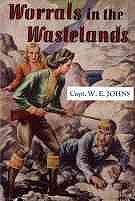 |
The title sounds like
an opportunity for Worrals to behave like Sherlock
Holmes. However, though there is a mystery in the story,
the events described draw more upon Worrals' resolution
of character than upon her powers as a sleuth. W.E.Johns
loved a story with an island in it and so did his
readers. Once again he takes us half way round the world
to the South Pacific and, not for the first time, we see
a possible island paradise turn into a place of
purgatory.
Worrals has defeated the Germans, raided the Japanese and
outwitted several sets of crooks and racketeers. More
than that she has helped women take their rightful place
at the centre of modern society, doing anything a man can
do and sometimes doing it better, Who was left to face
this intrepid woman and her reliable companion ? In this
story Johns provides the answer - someone who is not
simply bad but also mad.
Mysterious gun-shots, a palace of shells, an abandoned
yacht with a desperate prisoner and a disappearing body
are just some of the ingredients as the girls operate
further away from home and help than ever.
"What on earth was that ?" she asked in a voice
that she didn't recognize as her own.
Worrals, tight-lipped, shook her head. "Don't ask
me."
"It was frightful."
"Frightful is the word."
"No human being could make a noise like
that……"
There are also three short stories, one of which is to be
found sharing "Comrades in Arms" with a Biggles
story and a Gimlet King story.
A few more points……
You will find the official publication order (and the one
given on most web sites) contradicts the reading order
given in the summaries above with Worrals Carries
On being placed after Worrals Flies
Again because it was apparently published a
month later. However, the following internal evidence
from Worrals Flies Again contradicts
this and confirms the order above:
"One point occurs to me. Do you think it at all
likely that the Nazis will have a record of me, a
description, as a result of what happened in the past
?"
"I doubt it. After all, you weren't in France very
long, and most of your work was done at night."
This can only be a description of what has happened in Worrals
Carries On (Worrals and Frecks do not go to
France in Worrals of the WAAF !)
The first two stories are a rush of action with few of
the characters developed with any depth. The later
stories in fact contain more talk and speculation than
action. As with the Biggles saga it is very often the
ones in the middle that contain a balance of the best
qualities of W.E.Johns' writing.
Worrals -
Joan Worralson - 18 years old at the beginning of the
stories and "hard-boiled" by the end of the
war. Good at languages, especially French and German and
instinctively talented at shooting straight. Capable of
fearsome resolution yet also tender compassion. Her
self-possession and quick wits rarely let her down. She
is loyal to her comrades and deadly to her enemies. She
makes friends around the world. There is a definite
"bee in her bonnet" about the role of women and
she lets higher command know in no uncertain terms what
she feels about their condescending attitude. She is a
magnificent example of courage, determination and cold,
hard reasoning ability.
Frecks
- Betty Lovell - just a little younger than Worrals - in
fact in the first book she is not able to wear her wings
because she is not yet 18. She is fair-haired, casual in
her behaviour and apparently takes nothing in her life
seriously. Without any vanity, she makes no attempt to
cure the freckles that give her a nickname that most
would resent. She plays Watson to Worrals' Holmes but
also is filled with a deep courage that is often called
on in emergencies.
Bill Ashton - A Flying Officer in the
R.A. F. who shares most of the early wartime adventures.
His first instinct is to call Worrals and Frecks
"kids" but later his regard for Worrals turns
into something deeper. Totally reliable in the air, his
concern for the two girls sometimes leads him into
dangerous risks, inadvertently giving Worrals further
dilemmas as she has to organise his rescue as well.
Marriage is a subject that rears its head at the end of
the war but for Worrals the time is never right and
gradually Bill fades from the picture - always a
respected comrade and pal, never a prospective
bridegroom.
Squadron Leader
McNavish (later Wing Commander) - the Scottish
commanding officer of the base during the war. He can
snarl like a wounded tiger when Worrals dares to
contradict him. His conspicuous courage and his
magnificent record (DFC and DSO) however, take the sting
out of any blundering condescension that he shows towards
the efforts of women fliers. His attitude to the men from
"Intelligence" that try to recruit his officers
(female or not) is always defiant. "No officer of
mine has ever willingly left me…."
Squadron Leader
Marcus Yorke - one of those intelligence
officers that cause McNavish so much bother. His main
virtue as far as Worrals is concerned is that he listens
to her ideas and then, having made up his mind to trust
her, gives her missions his full backing.
Air Commodore
Raymond - always ready to employ Worrals when
the woman's touch is needed. Worrals often complains that
he only turns to her as a last resort. Again, once
committed to her exploits, he gives her his total
support.
There is also a whole
supporting cast of appalling villains, undercover agents,
helpful natives and ex-colleagues from the W.A.A.F. that
are better met as part of the stories- for to tell more
would be to give away some ofthe best parts of the
adventures.
WORRALS in the Girl's Own Paper
Special thanks to
Diana of the Abbey Girls of Australia for these lovely
examples of supporting illustrations and covers taken
from her collection of WW2 single issues of the Girl's
Own Paper, and to James for his illuminating article
above.
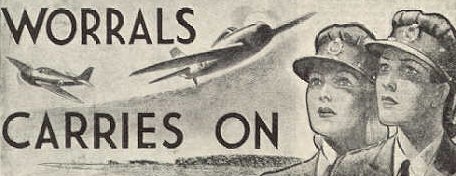
Banner title from serial, circa
1940s
|

|
Illustration at
left taken from the lower half double page of a
later issue, published in the small size of 5 x
7.5 inches. Despite wartime, these were
beautifully printed on slick, high quality paper.
|
This page and the photos in particular are for
the information of collectors and no copyright
infringements are intended.
Back to
Collecting Books & Magazines INDEX
END
|
bc |
